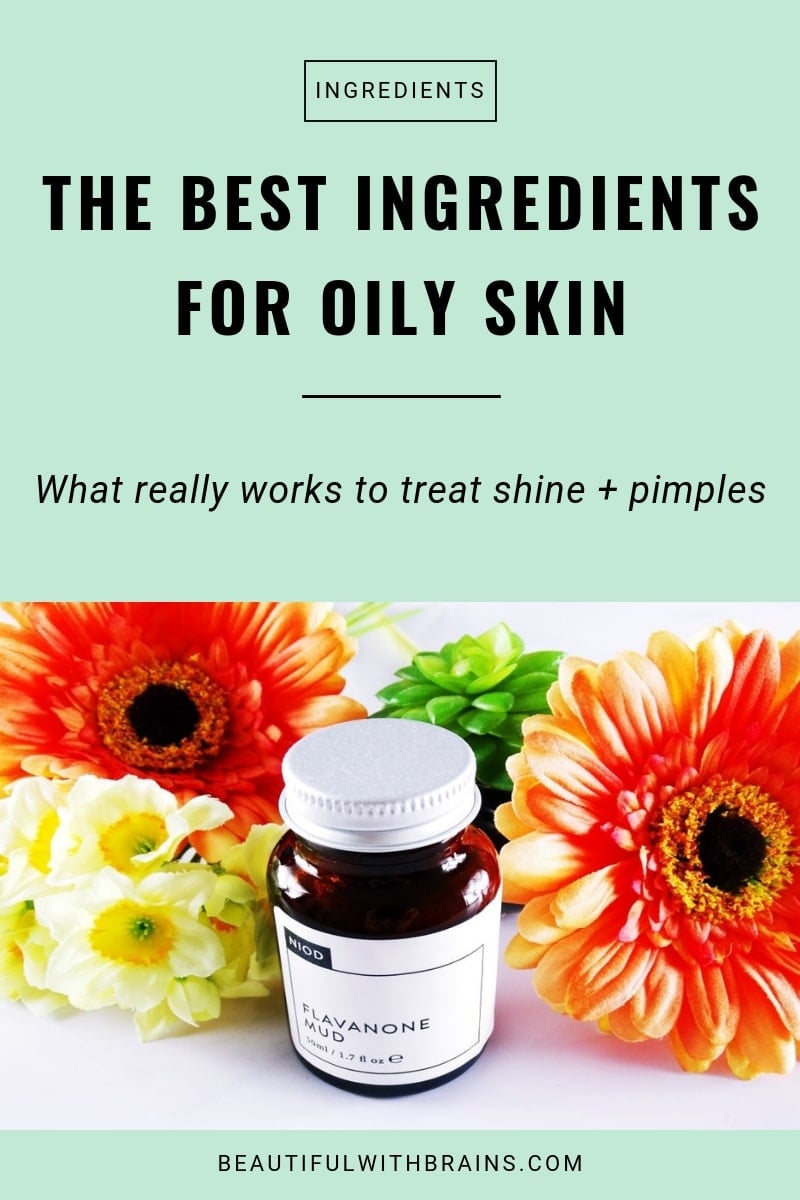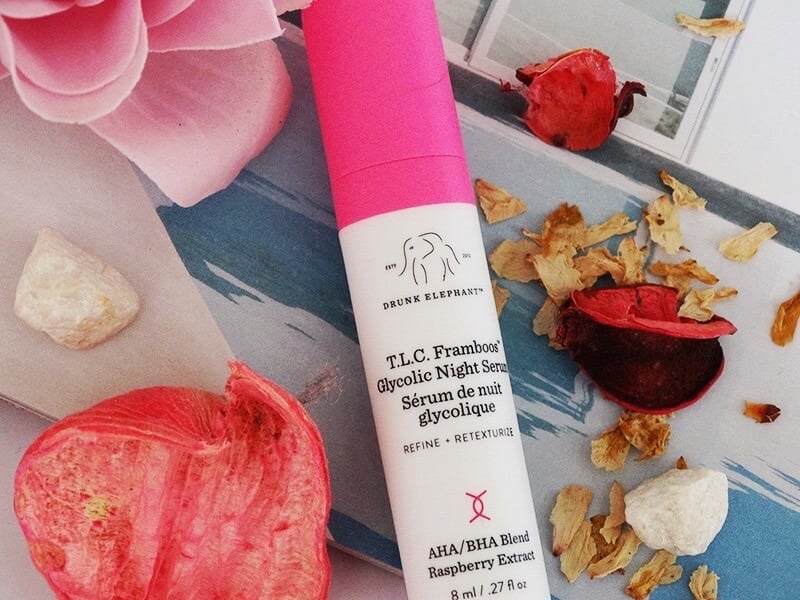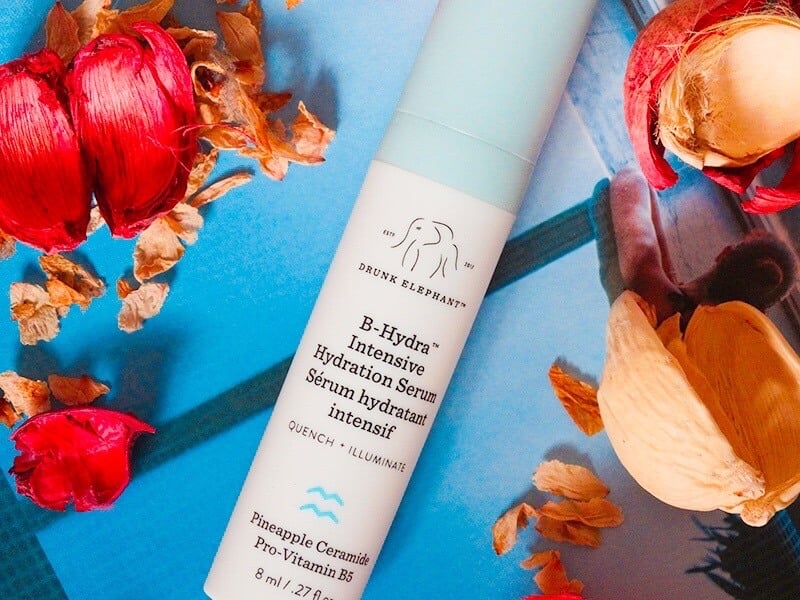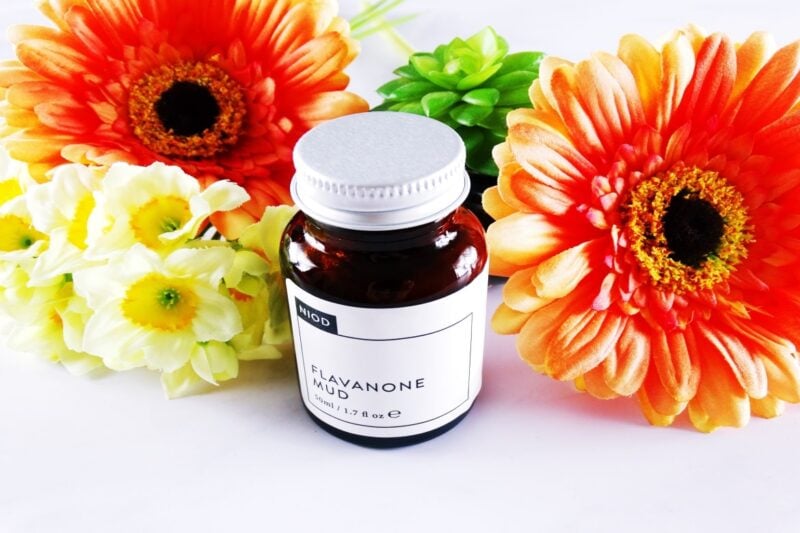
What are the best ingredients for oily skin? When people come to me, they usually say: “I’ve tried everything to keep my oily skin under control, but nothing works. Help!” Can you relate to that? Sometimes, dealing with oily skin seems like a hopeless battle. No matter what you try, your face keeps shining brighter than a frying pan, your pores refuse to shrink and those pimples won’t budge from your face. Argh!
It’s not your skin playing tricks on you. It’s the skincare products you’re using. Truth is, most skincare products marketed to oily skin DON’T contain anything that can really deal with excess shine, large pores and breakouts. To add insult to injury, sometimes they have ingredients that can make things way worse! So what works? Here are the best ingredients for oily skin that are scientifically proven to keep sebum production under control and pimples at bay once and for all:
How To Tell If You Have Oily Skin?
Oily skin produces too much sebum. Sebum is your skin’s natural moisturiser. When your skin produces just the right amount, your skin is soft, supple, and hydrated without you having it to do anything. It just looks great on it own. But when sebaceous cells go into overdrive and pump out too much sebum, your skin experiences all kinds of problems. Here’s the signs to look out for that let you know you have oily skin:
- Acne: The excess sebum gets stuck in the pores, where it mixes with dead skin cells. Acne bacteria go crazy for this mixture and eat it up. Next thing you know, you get pimples, blackheads, and whiteheads.
- Large pores: The extra sebum and dead cells stuck in the pores stretch them, so they look wider to the naked eye.
- Shine: The excess shine also makes your skin look like a disco ball – even though you’re not using any makeup.
If you thick all these boxes, you have oily skin. Read on to find out what are the best skincare ingredients for your skin type, so you can banish excess oil, get rid of pimples and blackheads, and make your pores invisible:

Best Ingredients For Oily Skin
1. Best For Blackheads: Salicylic Acid
What it is: Salicylic acid is member of the Beta Hydroxy Acids (BHAs) family. It’s the only BHA used in skincare.
What it does: Salicylic acid is an oil soluble exfoliant. Put simply, it can penetrate the skin’s lipid barrier and get deep inside your pores, removing all the excess oil and other crap that’s clogging them from within. Plus, it dissolves the glue that holds skin cells together on the surface of the skin . This dual exfoliating action removes blackheads, whiteheads, and pimples and prevents new ones from forming. Like that weren’t enough, salicylic acid also has anti-inflammatory properties that soothe the redness and irritation that always come along with acne.
How to use it: Too much exfoliation can have the opposite effect and dry out skin. Use it every other night, alternating it with retinol. Apply just after cleansing.
Side effects: If you’re allergic to salicylicate, including aspirin, stay away! If that’s the case, mandelic acid would be a better option for you.
Best Picks:
- Drunk Elephant T.L.C. Framboos Glycolic Night Serum ($90.00): Don’t let the name fool you. This exfoliant has both salicylic acid to unclog pores and glycolic acid to fade away the dark spots pimples sometimes leave behind. Available at Cult Beauty, Sephora and SpaceNK.
- Paula’s Choice Skin Perfecting 2% BHA Liquid ($29.00): The cult exfoliant from the brand, it unlclogs pores and treats blackheads and acne. The texture’s a little sticky, but if you can take that, this is one of the best salicylic acid exfoliants out there. Available at Cult Beauty, Dermstore, Net-A-Porter, Paula’s Choice, Sephora, and SpaceNK.
- The Inkey List Beta Hydroxy Acid (£9.99): A simple, no-frills salicylic acid exfoliant for people on a budget. Available at Cult Beauty and Sephora.
Related: Why Salicylic Acid Is The Key To Spot-Free Skin
Struggling to put together a skincare routine that banishes excess oil, blackheads, and pimples? Download your FREE “Best Skincare Routine For Oily Skin” to get started (it includes product recommendations + right application order):

2. Best For Hydration: Hyaluronic Acid
What it is: Hyaluronic acid is a humectant. It’s what we call ingredients that attract water from the environment into the skin. Glycerin and Urea are two other common humectants found in skincare products that are good for oily skin, too.
What they do: They infuse your skin with a waterfall of moisture, keeping it hydrated without adding more oil to it (that’s the last thing your skin needs). Hyaluronic acid is particularly good at this: it holds up to 1000 times its weight in water! All the extra moisture plumps up fine lines and wrinkles, so they look smaller to the naked eye. It also gives your complexion a subtle glow and makes it softer. When your skin has all the hydration it needs, it looks younger.
How to use it: You can use hyaluronic acid twice a day, both morning and evening. Apply it after anti-aging serums, like retinol and vitamin C, but before moisturiser.
Side effects: If there’s not enough water in the atmosphere, humectants can steal it from the deepest layers of your skin, drying it out. Hyaluronic acid puts up better with lack of water than other humectants. But if your hyaluronic acid serum is drying out your skin a little, now you know why. In this case, you may be better off with niacinamide.
Best Picks:
- La Roche Posay Heal B5 Hyaluronic Acid Serum (£27.75): A simple, no-frills Hyaluronic Acid serum to hydrate skin and soothe irritation. Available at Sephora and Look Fantastic
- Niod Multi-Molecular Hyaluronic Acid (£25.00): This baby contains 15 forms of Hyaluronic Acid to hydrate every layer of skin. It’s the most hydrating serum I’ve ever tried. Available at Beauty Bay and Cult Beauty
- Paula’s Choice Resist Hyaluronic Acid Booster ($34.00): It contains Hyaluronic Acid to hydrate skin and ceramides to create a protective barrier that keeps moisture in. Available at Dermstore, Nordstrom, Paula’s Choice and Selfridges
Related: Why You Should Add Hyaluronic Acid To Your Skincare Routine

3. Best To Absorb Excess Shine: Clays
What are they: Clays are minerals that absorb excess oil. The most common types of clays used in skincare are bentonite and kaolin clay.
What they do: They have oil-absorbing properties that soak up excess oil. Sebum is your skin’s natural moisturiser. When your skin produces the right amount of sebum it needs, it’s naturally moisturised and supple. When it produces too much, the excess gets stuck in your pores, causing blackheads and pimples. By absorbing excess oil, clays prevent it from getting it stuck in the pores and giving you breakouts. Plus, you don’t look like a grease ball. Just saying…
How to use them: A couple of nights a week. Apply them just after cleansing, leave them on for up to 20 minutes and the rinse them off before proceeding with the rest of your skincare routine.
Side effects: Clays can be drying when they absorb too much oil. Remember, sebum is your skin’s natural moisturiser. You want to remove the excess, not all of it!
Best Picks:
- Elizavecca Milky Piggy Carbonated Bubble Clay Mask (£20.00): A fun, if gimmicky mask, that reacts to the oxygen in the air, creating tiny bubbles all over your skin. But it does wonders at removing excess oil. Available at iHerb, Stylevana and Yes Style
- Niod Flavanone Mud (£29.00): A mess-free (yes, for real!) clay mask that feels comfortable on. It contains clays to absorb excess oils, antioxidants to fight premature aging and soothing ingredients to calm down irritations. Available at Beauty Bay, Cult Beauty, and Niod
- Paula’s Choice Skin Balancing Oil-Absorbing Mask ($26.00): Kaolin and bentonite clays soak up excess oil while colloidal oatmeal (yes, that’s oats!) soothes irritations and glycerin add moisture. Available at Paula’s Choice.
Related: What’s Bentonite Clay And What Does It Do For Skin?
4. Best To Treat Acne: Sulfur
What it is: Sulfur is a natural mineral that plays an essential role in the health of connective tissues, skin, muscles, bones, teeth, and hair.
What it does: Sulfur fights acne in several ways. For starters, it has antibacterial properties that kill the bacteria that cause acne. It also helps exfoliate dead skin cells, so they don’t get stuck in your pores, causing breakouts. Plus, it also helps reduces excess oil and dries out pimples.
How to use it: Sulfur is harsh, so use it on pimples only! You can use it two or three times a day, as close to clean skin as possible.
Side effects: Sulfur is drying and irritating. There’s never any good reason to apply it to healthy skin. This is something you only want to apply on your pimples to make them heal faster.
Best Picks:
- Epionce Purifying Spot Gel Blemish Clearing Tx ($42.00): The most effective spot treatment I’ve found, it massively reduced my pimple in one day and by day 3, it was gone. Available at Dermstore.
- Mario Badescu Drying Mask ($18.00): A clay mask enriched with sulfur to soak up excess oil and dry out pimples. It has cucumber extract to soothe irritations too. Available at Beauty Bay, Cult Beauty, and Ulta
- Peter Thomas Roth Therapeutic Sulfur Masque ($52.00): A 10% sulfur mask enriched with oil-absorbing clays and soothing aloe vera to get rid of pimples fast. Available at Dermstore, Peter Thomas Roth, Revolve, and Ulta
Related: Benzoyl Peroxide: Friend Or Foe?
5. Best For Anti-Aging: Retinol
What it is: Retinol is a form of Vitamin A, the only thing proven to reduce wrinkles. It needs to be converted into Retinoic Acid into your skin to work against wrinkles.
What it does: Retinol fights wrinkles in three ways. First, it fights the free radicals that cause premature aging. Then, it boosts the production of collagen, the protein that keeps skin firm and elastic. Finally, it speeds the skin’s natural exfoliating process. What does this mean for skin? Your skin exfoliates itself on its own, but giving it a helping hand has plenty of benefits – especially for oily, acne-prone skin. Acne-prone skin doesn’t exfoliate too well on its own. Dead cells stays on the surface of your skin for too long, eventually getting into your pores and clogging them up. Hello acne! By helping skin exfoliate itself faster, retinol helps prevent acne. Plus, exfoliation means the older, darker cells, leave their place to the newer, more even-toned ones. Translation: exfoliation helps fade away dark spots. If you want to tackle wrinkles, acne, and dark spots (or even just two of them) in one go, retinol is your best bet.
How to use it: Retinol can be drying and irritating, especially when you first start using it. Start with the lowest concentration you can find a couple of times a week and build up both dose and frequency from there. As retinol speeds up the skin’s natural exfoliating process, don’t use it on nights you exfoliate. Instead, alternate retinol with an exfoliate at night.
Side effects: Retinol is drying and irritating, so introduce it into your skincare routine carefully. Moisturise well afterwards to counteract its drying effects.
Best Picks:
- Paula’s Choice Resist Wrinkle Repair Retinol Serum ($42.00): An anti-aging serum with 0.1% retinol. It also includes antioxidants, like Vitamin E, to prevent premature aging, and soothing ingredients to reduce irritations. Available at Paula’s Choice and Sephora.
- Skinceuticals Retinol 0.3 Night Cream ($62.00): This cream contains only 0.3% retinol but it packs an anti-aging punch. It comes in a moisturising base, but you need to use a separate moisturiser to counteract the dryness of retinol. Available at Dermstore and Skinceuticals.
- Paula’s Choice 1% Retinol Booster ($52.00): This high-strength 1% retinol booster has a moisturising base and plenty of skin-soothers to counteract the irritating effects of retinol. Use it on its own for maximum effect or dilute it with moisturiser if it’s too harsh for you. Available at Cult Beauty, Net-A-Porter, Paula’s Choice and SpaceNK.
- Peter Thomas Roth Retinol Fusion PM ($65.00): A micro encapsulated 1.5% retinol serum in an oily, moisturising base to fight wrinkles and fade away dark spots. Available at Beauty Bay, Cult Beauty, and Peter Thomas Roth.
6. Best For Everything: Niacinamide
What it is: Niacinamide is a form of Vitamin B3.
What it does: I call niacinamide the jolly of skincare because it does everything. Studies show that niacinamide stimulates the production of collagen, the protein that keeps skin firm. It also reduces both the redness that comes along with pimples and the dark spots they sometimes leave behind after they pop. That’s not all. It also helps treat acne. 4% niacinamide is just as effective as 1% clindamycin gel in the treatment of acne vulgaris“. One more thing: niacinamide is a great moisturiser for oily skin. It hydrates without adding pore-clogging oils to it. Its moisturising and soothing properties also help your skin better tolerate harsher anti-acne fighters, like sulfur and retinol.
How to use it: You can use niacinamide up to twice a day, after anti-aging serums.
Side effects: Niacinamide is very gentle and anyone can use it. A tiny number of people will sensitive skin will experience flushing. Otherwise, there’s no reason not to use it.
Best Picks:
- Paula’s Choice Resist 10% Niacinamide Booster ($42.00): It shrinks your pores, hydrates your skin, and brightens the complexion. Plus, it’s full of antioxidants (including Vitamin C) to help you keep those pesky premature wrinkles at bay, too. Available at Cult Beauty, Dermstore, Paula’s Choice, Sephora, and SpaceNK
- The Inkey List Niacinamide ($6.99): On top of hydrating niacinamide, it also has hyaluronic acid to add moisture back into the skin and Squalane to strengthen its protective barrier. Plus, it brightens skin and helps prevent wrinkles. Available at Boots, Cult Beauty, The Inkey List
- The Ordinary Niacinamide 10% + Zinc 1% (£5.00): Suitable only for oily skin, it reduces excess oil, helps treat acne, and reduces redness and inflammation. Available at Beauty Bay, Boots, Cult Beauty, Sephora, SpaceNK, The Ordinary, and Ulta
7. Best For Wrinkle Prevention: Sodium Ascorbyl Phosphate
What it is: A water-soluble derivative of L-Ascorbic Acid, the pure form of Vitamin C. It’s made by combining Ascorbic Acid with a phosphate and a salt, two compounds that work with enzymes in skin to split the ingredient and release pure ascorbic acid into your skin.
What it does: Like all forms of Vitamin C, it has antioxidant properties that fight the free radicals that cause premature aging. Plus, it brightens skin. What sets it apart from all the other forms of Vitamin C (yes, there are a gazillion of them!)? Sodium Ascorbyl Phosphate is the only form of Vitamin C that can fight wrinkles. A study published in the International Journal of Cosmetic Science shows that 1% of Sodium Ascorbyl Phosphate reduces the amount of P.Acnes on your skin, while 5% prevents lipid oxidation (this process inflames your skin and causes acne) by 40%!
How to use it: Every morning, right after cleansing and before sunscreen.
Side effects: It’s very gentle and well-tolerated even by sensitive skin.
Best Picks:
- Artnaturals Vitamin C Serum ($12.99): A hydrating Vitamin C serum for oily skin, it fights free radicals, brightens your complexion, and reduces sebum oxidation to keep acne at bay. Available at Target.
- Derma E Vitamin C Radiance-Boosting Renewing Moisturizer ($23.95): Even though it’s loaded with moisturising oils, it has a lightweight texture that sinks in quickly. Thanks to Vitamin C, it also brightens skin. Available at Derma E, iHerb, and Ulta.
- Mad Hippie Vitamin C Serum ($33.99): My fave serum with Sodium Ascorbyl Phosphate, it features its fair share of antioxidants and soothing ingredients, like ferulic acid and chamomile, to prevent wrinkles and soothe irritations. Available at iHerb and Ulta.
What Ingredients Should You Avoid If You Have Oily Skin?
Now you know what are the best ingredients for oily skin, let’s take a quick look at what you should avoid:
- Alcohol Denat: It soaks excess oil… and disrupt the skin’s protective barrier in the process. This dries out skin, causing it to produce even more oil to compensate. Now, if Alcohol Denat is included in a formula loaded with moisturising ingredients to counteract its drying effects, you can still use it. But this toners with Alcohol Denat and nothing else? Leave them on the shelf.
- Natural oils: With the exception of Squalane, Jojoba Oil, and Rosehip Oil, all other oils are too rich and can clog pores and aggravate acne.
- Palmitates and Myristates: Isopropyl Palmitate, Myristyl Myristate, and any ingredient with Palmitate and Myristate in the name is highly comedogenic. My skin isn’t prone to acne, but every time I use them, it’s pimples galore. Avoid!
- Strong cleansers: If your skin feels tight and squeaky clean after washing, your cleanser is too harsh and disrupts your skin’s protective barrier, leading to inflammation and more oil production down the line. *sighs*
The Bottom Line
The best ingredients for oily skin are salicylic acid to exfoliate and prevent acne and sulfur to treat it. Oily skin also loves hydrators like hyaluronic acid and niacinamide that keep skin soft and smooth without adding more oil to it. Retinol and Sodium Ascorbyl Phosphate are the best for anti-aging – and they double up as acne fighters too. And to absorb excess oil, there’s nothing better than natural clays. Instead, stay away from anything that could dry out skin or aggravate acne. That’s the last thing your skin type needs.


As an oily skin gal, I use all these ingredients. I’m going to purchase a few Paula’s Choice products as soon as I finish up my current products, her line looks quite good 🙂
Monica.
Monica, they are all very helpful, aren’t they? Her line is very good indeed. I have a few serums and love them. 🙂
Check, check, check and check!
Melissa, glad you’re using them all!
a quick thank you from a stick-of-butter-kind-of-skin-person
Ramona, my pleasure! Glad you found it useful.
Haven’t checked my feeds in a while, so I’m late to the party. Anyway, you should add 5-alpha reductase blockers to the list. 5-AR is an enzyme that converts testosterone to DHT in the skin (DHT stimulates sebum production much more than T). Blocking the enzyme reduces the effect hormones have on the skin, one of them being stimulation of sebum production.
There are a handful of studies (not very rigorous, though) that show 5-AR blockers can reduce sebum production. Green tea, or the catechin EGCG, is the best known. Some fatty acids also have the same effect.
L-carnatine can also help. It’s been shown to increase metabolism of fatty acids in skin cells, in effect causing the skin cells to burn more fat. One study (again, not very rigorous) showed a nice reduction in skin oiliness with topical l-carnatine.
Seppo, thank you for your comment. They both sound wonderful, and a great addition to any oily skinned gal’s arsenal.
A great post indeed. I have extremely oily skin which is very rare in India and humidity makes it worse!
Could you plase suggest a mineral sunscreen as all other chemical sundcreens break me out.
Sneha, have you tried Sunumbra SPF40? You can only buy it online but it’s one of the best I’ve found. Skinceuticals makes a mineral sunscreen too that’s very lightweight and perfect for oily skin.
thanks for your help. We do not get the ones above in India. I will order them when I have frnds coming over from States.
BTW what are your reviews about Clinique mineral sunscreens?
Sneha, they leave a very obvious white cast but, apart from that, they’re good products.
I am trying the sample from Clinique and I seem to love it 🙂
That’s wonderful Sneha! 🙂
Thank you for this, I have so much of acne induced dark spots on my face. Could you please name some products containing these ingredients in Nigeria?
Blessinglab, glad you find this helpful but unfortunately I don’t know what brands are available in Nigeria. Just look for salicylic acid or BHA on the ingredient list.